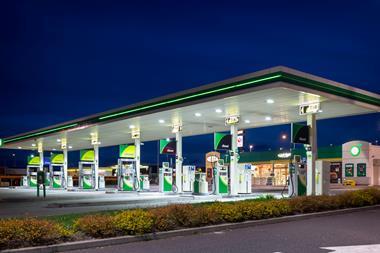Back in September’s issue we asked whether the forecourt shop sales were starting to run out of steam, given some rather disappointing Database figures from June. Well, the rest of summer 2004 proved to be even more disappointing than those early results from June had suggested, as just a quick glance at the ‘Comparator’ table for the latest available figures (August) will illustrate: our Monthly Shop Sales value is lower in cash terms than it was a year earlier – £53,558 against £54,233. Since we started publishing the current Database format back in 1996 we have only had two previous occasions where the current month’s sales value was lower than it had been 12 months previously – and both of those (September 2000 and February 2001) were isolated results for special reasons (the fuel blockade and comparison to leap year, respectively).
In straightforward cash terms, therefore, sales this August were 1.2% lower than last year. However that’s not the worst news. If we strip out the effects of RPI increase (that is, keep the sales values at constant prices) and look at the four months from May through August and compare them with the same period last year, sales have been flat – indeed they actually show a tiny drop of 0.02%. Do the same for the three months of June, July and August and we see a drop this year of 1.36%. As if that wasn’t bad enough, August’s shop GP was down by 3.9% on the equivalent period last year.
Of course the petrol retail business does not exist in some sort of bubble, totally immune to what goes on in the wider retail sector, or the economy as a whole. Many High Street retailers had a disastrous summer, quite a few of them blaming it on the weather. Comparing petrol retailing statistics with the rest of retail is not exactly easy, but an approximate comparison of trends can be established using retail figures from the Office of National Statistics. Taking their ‘EAFY’ series, which includes all retail sectors, and comparing its trend with our own sales values for 2004. The results show that, broadly speaking, the two trends are similar. In both cases August’s sales values were heading south. If anything the petrol retail sector shows a less dramatic fall-off than the rest of retail. The ONS itself reports that “A slowdown in the underlying growth rate of retail sales is evident in the latest results (August) for the Retail Sales Index…three-monthly growth rates in August decreased for all retail sectors except household goods stores”.
So, it’s official then – the combination of interest rate rises and resultant bursting of the housing bubble, together with almost constant increases in fuel prices over the summer, have managed to take the fizz out of retailing? Perhaps, we’ll know more as we see the sales trends towards Christmas. But just because retail as a whole is depressed doesn’t mean that all retailers have to sit back helplessly and blame everyone else. You can place a reasonably safe bet that the likes of Tesco and Asda will continue to report some growth, come what may. As we said a few months ago, those who continue to improve their customer-offer – and to make sure that customers know about it– tend to defy the trends. Those who simply get it wrong at the customer end will suffer.
In the present fuel-price environment, the oil majors seem to be keeping their heads down below the parapet. Even the few who still have good ideas for their shop offering seem to be too embarrassed by the price of fuel to do much in the way of advertising. Sadly, there are still too many forecourts out there that look OK from a distance but where the shop is a huge let-down with out-of-date or poorly pricemarked stock, half-empty shelves and cabinets, special-offer stock that looks as if it just fell off the back of the proverbial lorry and was dragged into the shop. Worst of all, there are lots of sites that look as if they’re being cleaned and maintained on an emergency-only basis.
Perhaps in the independent sector there is more joy to be had if the shop is under a well-known symbol group who is not afraid to keep promoting their shops. But even here the site operator has to make sure that they’re keeping just the right amount of up-to-date stock and that the whole ambience of the place is clean and customer-friendly. There is no easy way to defy an apparently ‘macro economic’ sales trend, but those who don’t even try will probably find themselves out in the cold over the coming months.
All data supplied by EKW group



























No comments yet